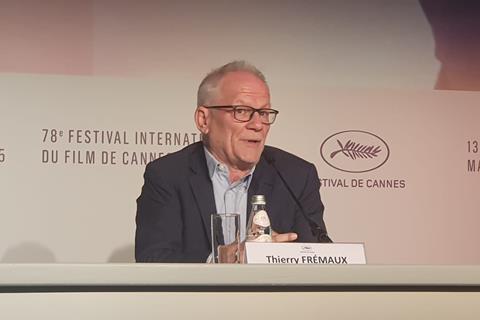General delegate Thierry Fremaux bristled at the notion that Cannes Film Festival always selects the same filmmakers for its Competition, saying
General delegate Thierry Fremaux bristled at the notion that Cannes Film Festival always selects the same filmmakers for its Competition, saying that “it’s really not true.”
At the pre-festival press conference, Fremaux was asked why the Dardenne brothers are in Competition for the ninth time, with their film The Young Mother’s Home.
“This question hides another one,” said Fremaux, mimicking those who say “‘the Dardenne brothers yet again, it’s always the same people!’”
“If you look at the statistics, it’s not,” said Fremaux, citing the first-time filmmakers in Competition this year, including Ari Aster with Eddington, Carla Simon with Romeria and Chie Hayakawa with Renoir.
“Some are coming for the second time – [Julia] Ducournau; [Joachim] Trier for the third, Wes Anderson for the fourth time. But most of the selection is made up of filmmakers who are coming for the first time.”
Of why certain filmmakers are repeatedly selected in Competition, Fremaux said that the festival has “always had this tradition” of remaining committed, dating back to the 1950s and ’60s with filmmakers such as Ingmar Bergman.
“Julia Ducournau’s Alpha is very impressive, it will create a wonderful debate and we want this debate to take place here in Cannes,” said Fremaux. “We support people like Julia and we want to continue to provide this support.
“The Dardennes brothers, their whole body of work is social cinema – a coherent cinema with a special style. If we feel this kind of cinema is important, we have to keep providing support.”
The festival begins tomorrow with the world premiere of Amelie Bonnin’s Out of Competition title Leave One Day. Robert De Niro will receive an honorary award at the opening ceremony, ahead of participating in a Rendez-vous session on Wednesday, May 14.
The other participants in the Rendez-vous programme are Christopher McQuarrie, Alexandre Desplat and Guillermo del Toro. Fremaux revealed that a woman was booked to appear in the programme but “at the last minute that person had to change their schedule”, meaning they could no longer attend.
“We have to be very watchful on this point [of gender parity],” said Fremaux, who cited the four female presidents of juries this year including Competition president Juliette Binoche; and noted that it is the first time the festival has had women Competition jury presidents in consecutive years since Olivia de Havilland and Sophia Loren in 1965 and 1966.
“It has been 60 years since that happened – that’s a scandal,” said Fremaux.
Tariffs
The Cannes director would not be drawn on the possible effect of US tariffs on international films, as proposed by Donald Trump last week. “It’s far too early in the game,” said Fremaux, reiterating his love for American cinema. “We wouldn’t like the American cinema to cease to be strong. This year it is strong, it is creative – that’s what counts.”
Fremaux was questioned about Gerard Depardieu, with the verdict in the French actor’s trial for sexual assault due tomorrow (Tuesday, May 13); and whether the actor would be welcome back at Cannes. Framing his answer as that of “a citizen”, Fremaux said, “I respect the legal system of my country, I will simply note the decision handed down by the court.
“If he has served his sentence as a citizen, what does one do?” continued Fremaux. “The festival, and you, and public opinion – we have to deal with this on a case-by-case basis. I’m happy the press conference is being held today, not tomorrow.”
In a conference lasting over one hour, Fremaux also touched on the rise of artificial intelligence in the industry, noting that “it has been around for some time” but that “it’s becoming something very powerful, interesting, disquieting at the same time. Its use needs to be controlled. We must uphold the principle of copyright, actors’ rights as well.”
He recalled that Cannes festival staff were presented with an AI recording of his voice, for a training session at which he could not be present. “It’s scary, it’s frightening,” admitted Fremaux. “It’s a societal question, it doesn’t just concern cinema. We’ll have to tread carefully.”
Mission: Impossible – The Final Reckoning is the major blockbuster premiere at this year’s festival, on Wednesday 14. Fremaux was asked what the benefit is to the festival of playing the film when its director and stars are doing very little press on-the-ground in Cannes, with no press conference.
It was selected because “it represents the cinema we like, I like” said Fremaux, and to allow the festival to pay tribute to McQuarrie. The Cannes director cited Francois Truffaut and Jacques Rivette as examples of filmmakers who succeeded “within a straitjacketed system – you could be an artist and a filmmaker”, and said that McQuarrie is the same.

COMMENTS